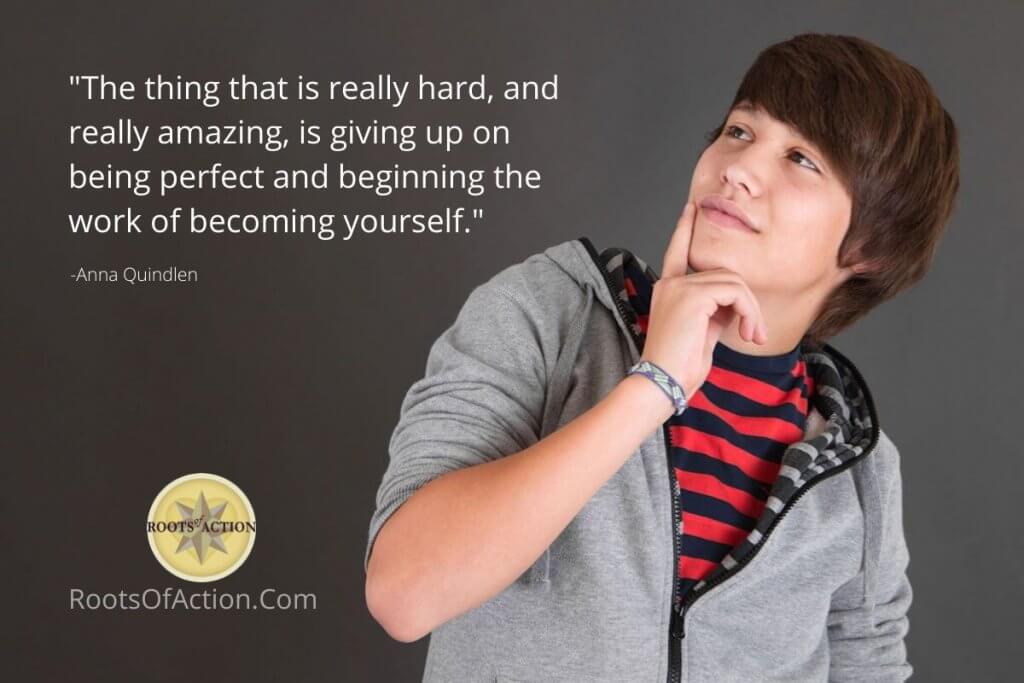
Research shows that young people who develop inner strengths and attributes during childhood and adolescence are more likely to flourish in school, careers, and adult life. That’s because success goes far beyond external achievements. It is driven by our core abilities to form positive relationships, collaborate, lead, and contribute to our communities.
What are inner strengths?
Most people agree that inner strengths help us act courageously, overcoming fear, failure, and life obstacles. But they actually do so much more.
Dr. Martin Seligman, founder of positive psychology, suggests that inner strengths encourage optimism, boost well-being, and literally guide us through life.
In his book, Authentic Happiness, Seligman claimed, “for the last half century psychology has been consumed with a single topic only—mental illness.” He urged psychologists worldwide to study the positive side of human development—inner strengths like creativity, curiosity, kindness, citizenship, gratitude, social intelligence, and hope.
Rooted in positive psychology research, my work in positive youth development suggests that eight categories of inner strengths work together to help young people become caring family members, innovative workers, ethical leaders, and engaged citizens.
The Compass Advantage framework defines those inner strengths as curiosity, sociability, resilience, self-awareness, integrity, resourcefulness, creativity, and empathy. These strengths not only foster a young person’s social-emotion learning (SEL) but also contributes to their cognitive and somatic (body-centered) learning.
My research suggests we must view these inner strengths as an integrated whole and nurture them at home, school, and in after-school programs. Not one of these strengths alone is enough. They work in tandem to help youth and adults succeed.
Discussing Inner Strengths with Youth
Unfortunately, the inner strengths that comprise The Compass Advantage framework and other positive youth development models are not often taught or discussed with young people. Instead, we naively believe they will emerge without intentional support and encouragement.
While grades, high-school graduation rates, and college admissions are important, it is easy to forget that children’s inner strengths are what propel them successfully through school and life. It is these abilities that help young people find meaning, purpose, and the motivation to accomplish their goals.
Anna Quindlen said, “The thing that is really hard, and really amazing, is giving up on being perfect and beginning the work of becoming yourself.”
Learning to become yourself is the work of adolescence! And it is an amazing process!

When young people understand their core human attributes–know themselves beyond external accomplishments–they learn to believe in themselves.
The Compass Surveys
With the launch of our free Compass Survey for Youth, young people between the ages of 10 and 17 have the opportunity to explore their inner strengths and better understand how these attributes help them become pilots of meaningful, productive and fulfilling lives. There are also surveys for adults and families with children ages 5-17.
Between the ages of 10 and 17, children’s brains are particularly ready and eager to learn about themselves—to discover their self-identities. They can better understand their own inner strengths through engaging discussions with peers and adults, by identifying the compass attributes as they study characters in books, and through the ways they engage with role models.
The conversation starters in the next section are designed to be used in tandem with the Compass Youth Survey. Upon completion of the survey, young people receive emailed results that introduce them to each of their eight inner strengths. Their results are always private and confidential, so it’s important to respect each young person’s choice to share.
Whether a young person takes a free survey from our website or completes a Group Youth Survey provided by a school or after-school program, completing the survey can stimulate important learning about inner strengths.
How to Spark Conversations About Inner Strengths
In Classrooms and After-School Youth Programs
The following conversation starters can prompt deeper discussion about one’s personal attributes and how they positively influence success and well-being.
- Do you agree that inner strengths may be more important than grades? Why or why not?
- How do internal strengths influence academic success?
- Which compass attributes are most challenging to practice in everyday life? Why?
- Which inner abilities help build positive relationships? How?
- What is the best way to grow your inner strengths?
- How do inner strengths make us better citizens—to work collaboratively for positive social and environmental change?
- When we work together as peers, how can we support each other’s internal growth and development?
- How does bullying affect the inner strengths of the person doing the bullying? The person being bullied?
- Who is a role model or mentor to you? Describe that person’s inner strengths.
- Who in your life has nurtured your inner attributes? How?
- What compass attributes are most important in leaders? Why?
- How can your inner abilities affect your mental health?
- Think about a character from a book, movie, or TV show that had to overcome obstacles in order to succeed. What inner strengths were his/her greatest assets?
- As we approach this upcoming project, share one of your own compass attributes that will contribute to our work together. How might you help others exercise that attribute?
At Home
Family values and practices that foster the development of inner strengths are at the core of positive parenting. A family meeting is an excellent venue to discuss the Compass Surveys, if your child is open to doing so.
To be most effective, we suggest adults and children ages 10-17 take surveys. This can be done is several ways. Parents can take the Family Survey for Youth with a child in mind. That child can also take a Youth Survey. This provides a unique opportunity to discuss parent and child perceptions, which may be different from each other. Parents can also take an Adult Survey which identifies their own inner strengths.
The following conversation starters can prompt deeper family discussions:
- What did you learn about yourself or each other by taking a Compass Survey?
- How do our perceptions of each other’s strengths differ?
- How are grades and test scores related to inner strengths? Which is most important?
- How does our family help nurture each other’s core strengths?
- How does our family hinder each other from developing or exercising our compass abilities?
- What should we keep doing as a family to strengthen our core attributes?
- What should we stop doing as a family that will strengthen our core attributes?
Listening with Respect and Gratitude
Our inner strengths are an integral part of who we are as human beings. They can be difficult to identify in oneself and even harder to articulate to others. Particularly during adolescence, children are exploring themselves and their abilities. They likely want to believe in themselves but may not understand that success is deeper than grades and getting into the college of their choice.
Talking about inner strengths and fostering them every day in children involves listening to kids with respect. It means honoring the idea of internal wealth instead of focusing all a child’s praise and reward on external achievements. When we express gratitude for who children are on the inside, they learn to appreciate and believe in themselves.
When we believe in ourselves, goals become achievable.
Related Articles You May Enjoy
Self-Awareness Quotes That Help Kids Explore Their Inner Selves
Published: February 1, 2020



